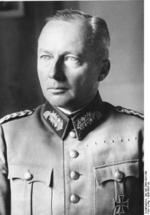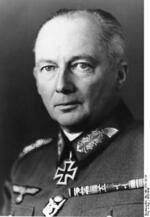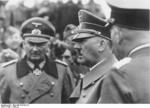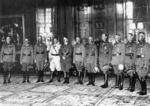Günther von Kluge
| Surname | Kluge |
| Given Name | Günther |
| Born | 30 Oct 1882 |
| Died | 19 Aug 1944 |
| Country | Germany |
| Category | Military-Ground |
| Gender | Male |
Contributor: C. Peter Chen
ww2dbaseGünther Hans von Kluge was born in Poznan, Germany. He was a veteran of WW1, participating in major battles such as the Battle of Verdun in 1918 as a field artillery specialist. He achieved the rank of major general in 1933, then lieutenant general in 1936. He strongly objected to Adolf Hitler's aggressive foreign policy and was appalled by the anti-Semitic shown by the Nazi party, and as a result he was dismissed from the army in 1938. However, his enthusiasm in mobile warfare had always held a high place with Hitler, and was soon recalled back to the Sixth Army Group (later renamed Fourth Army) as its commander. He led this army in the invasion of Poland, Belgium, and France, personally motivated by his belief that the Treaty of Versailles was unjust, and Germany should be compensated for such injustice. His contributions in the fall of France earned him the rank of field marshal on 19 Jul 1940. In the westward campaign, Kluge developed innovative tactics involving the use of armor.
ww2dbaseThe Fourth Army was then sent to the Eastern Front as a part of Army Group Center. His troops took Smolensk in Jul 1941, then marched on toward Moscow as he repeatedly bested the defenders in Ukraine and Russia. In Jun 1942, Kluge replaced the ill Fedor von Bock as the commander of Army Group Center early 1942, inheriting an army that had already lost its forward momentum, stopping miles short of Moscow itself. The halt at Moscow demoralized his army, and he submitted a recommendation for a limited withdraw to regroup the army; the request was angrily rejected by Hitler, and this decision further steered Kluge's faith in Hitler.
ww2dbaseOn 27 Oct 1943, he was badly hurt in a motor vehicle accident on the Minsk-Smolensk road and was unable to return to service until Jul 1944. During his absence, his lieutenants developed the notion that the war was not winnable. Von Kluge was approached by Henning von Tresckow, Bock's newphew and Kluge's former chief of staff at Army Group Center, to join his efforts to overthrow Hitler. Tresckow argued that Hitler's racist regime would bring Germany to utter destruction. Von Kluge thought it was dishonorable for a military officer to attempt assassination on his leader, and refused to participate. However, he would continue to meet with the conspirators.
ww2dbaseVon Kluge returned to service on 29 Jun 1944 as Commander-in-Chief West, replacing Field Marshal Gerd von Rundstedt. In Jul, Claus von Stauffenberg's failed attempt to assassinate Hitler, which was coupled with an attempt to overthrow the Nazi government. Von Kluge was approached to use his influence to inspire a mass uprising by the troops he commanded, but he refused. The assassination attempt, along with the coup, failed very quickly, and it led to a purge of the German army by Hitler. Kluge's name appeared on a list of suspected conspirators, and the list was presented to Adolf Hitler.
ww2dbaseAs Commander-in-Chief West, Kluge's army slowly fell apart in France after the Allies' successful landing in Normandy. He once against requested Hitler the permission to fall back to the Rhine, but it was once again denied. Already doubtful of Kluge's loyalty, Hitler now suspected that Kluge was negotiating a surrender to the Allies. On 16 Aug 1944, Kluge received a letter from Hitler asking him to take a brief rest in Berlin to escape the stresses of war, while his position was being taken by Field Marshal Walter Model. Von Kluge feared that Hitler learned of his involvement with the conspirators of the 20 Jul assassination attempt. Three days later, en route to Berlin, he swallowed cyanide and committed suicide.
ww2dbaseHis suicide note, addressed to Adolf Hitler:
ww2dbaseWhen you receive these lines I shall be no more. I cannot bear the reproach that I have sealed the fate of the West through faulty measures, and I have no means of defending myself. I draw a conclusion from that and am dispatching myself where already thousands of my comrades are. I have never feared death. Life has no more meaning for me, and I also figure on the list of war criminals who are to be delivered up.
ww2dbaseOur applications were not dictated by pessimism but by sober knowledge of the facts. I do not know if Field-Marshal Model, who has been proved in every sphere, will still master the situation. From my heart I hope so. Should it not be so, however, and your cherished new weapons not succeed, then, my Fuhrer, make up your mind to end the war. The German people have borne such untold suffering that it is time to put an end to this frightfulness. There must be ways to attain this end, and above all to prevent the Reich from falling under the Bolshevist heel.
ww2dbaseSources: Joric.com, Spartacus Educational, Wikipedia.
Last Major Revision: Aug 2005
Günther von Kluge Interactive Map
Photographs
 |  |  |  |
Günther von Kluge Timeline
| 30 Oct 1882 | Günther von Kluge was born. |
| 19 Jul 1940 | Günther von Kluge was promoted to the rank of Field Marshal at the Kroll Opera House in Berlin, Germany. |
| 18 Dec 1941 | Adolf Hitler finally accepted Walther von Brauchitsch's resignation, and took personal command of the Army and all Eastern Front operations. He fired Feldmarschall Fedor von Bock, replacing him with Günther von Kluge. |
| 30 Oct 1942 | For Günther von Kluge's birthday, Adolf Hitler gave him a gift of 250,000 Reichsmarks, half of which was for a renovation of his estate. Accompanying the gift was a special permit which allowed him to embark on such a renovation during war time. |
| 27 Oct 1943 | After suffering severe injuries in a car crash, Feldmarschall von Kluge was invalided home. |
| 2 Jul 1944 | Feldmarschal Günther von Kluge replaced Gerd von Rundstedt as the commanding officer of the German forces in the West (Oberbefehlshaber West). |
| 19 Jul 1944 | Günther von Kluge was appointed the commanding officer of the German Army Group B (Heeresgruppe B). |
| 30 Jul 1944 | Günther von Kluge wrote to Adolf Hitler, warning that the entire western front was on the brink of collapse. |
| 19 Aug 1944 | Field Marshal Günther von Kluge committed suicide by taking cyanide near Metz, France after being relieved of his command and recalled to Berlin, Germany. |
Did you enjoy this article or find this article helpful? If so, please consider supporting us on Patreon. Even $1 per month will go a long way! Thank you. Share this article with your friends: Stay updated with WW2DB: |
Visitor Submitted Comments
17 Jan 2022 03:32:26 AM
General Gunther VOn Kluge was my great, great uncle. My grandfather used to talk of him, when he was growing up in Germany and how good he was to the family. He saw to it that relatives received proper medical care and used his high standing to do this. My Grandfather told us a lot about Gunther Von Kluge and that he did commit suicide, fearing that Hitler already had his death planned. So, to the post from 11/16/20, I believe your source must be thinking of someone else and not Von Kluge.
All visitor submitted comments are opinions of those making the submissions and do not reflect views of WW2DB.
» Invasion of Poland
» Invasion of France and the Low Countries
» Battle of Moscow
- » 1,150 biographies
- » 337 events
- » 44,024 timeline entries
- » 1,242 ships
- » 350 aircraft models
- » 207 vehicle models
- » 375 weapon models
- » 123 historical documents
- » 260 facilities
- » 470 book reviews
- » 28,598 photos
- » 432 maps
Winston Churchill
Please consider supporting us on Patreon. Even $1 a month will go a long way. Thank you!
Or, please support us by purchasing some WW2DB merchandise at TeeSpring, Thank you!
16 Nov 2020 02:48:58 AM
My father was Special Forces Army. Did covert ops behind German lines. Never wanted to talk about it. Very elusive bits of service. Said he went after a French official who sided with the Nazis and that he got him. Long story short I believe this to be Phillipe Henroit. A Vichy Propaganist. The other soldier involved with this (Sanchez) told me that Von Kluge was assisnated by himself and my father and the notion of suicide was a BS coverup. And while I cannot attest to the veracity, both men died a long time ago without me asking the "right" questions, Sanchez was quite old when we corrosponded and he could have been mistaken etc. Although he was very adamant well founded. The suicide note seems very compelling but I still wonder. I guess I may never know for certain. Military related historical facts are important and should be correcr...